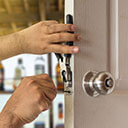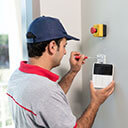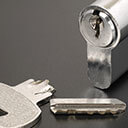Access Control

Security technologies are improving all the time. Because of this, access control systems have become more widely available, for homeowners and business owners alike. Reliability and user-friendliness are among the many reasons why this residential and commercial security option is so well-regarded. You’ll commonly find these systems installed in hospitals, schools, apartment complexes, homes, and various buildings that need to handle a large influx of people on a day-to-day basis.
Of course, different options are going to vary in sophistication and price range – but they’re well worth investing in if you’d like more peace of mind over your property’s security. In case you need convincing, here are just a few of the great protective features you’ll find in your access control system of choice.
The basic mechanisms
For the benefit of those unfamiliar with how access control works, we’ll start with a brief introduction.
In a nutshell, this is a keyless security mechanism that allows you to monitor who can enter or exit your property at any given time. Usually, the “access” point in which these are installed is an entry door or gate, but you’ll likely find them in elevators too – think of buildings where you need special swipe cards to access specific floors and rooms.
Those who are granted authorized access to the property can enter by electronic means or via an operator. Some systems might even incorporate CCTV surveillance for additional security.
So, what can you get out of a good access control system?
Not only do these protective mechanisms enable you to regulate property admission, they also come with various benefits:
No more stressing over keys. You won’t be fumbling around to find the right key for your door, nor will you ever have to worry about misplacing it. Also, without the need of keys to access your property, you’re less likely to get locked out after hours – that is, provided you don’t forget to carry your swipe card with you.
More adaptability. If your keys get in the wrong hands, you’ll need to replace your locks. With an access control system, all you have to do is alter your entry code, or simply delete an old key card from the system and issue a new one. This is perfect for businesses – if an employee leaves for another job, or one of your staff loses their card, you’ll be able to update your database within a few minutes.
They’re customizable and secure. You can grant someone as little or as much access as you see fit, with no worries about someone duplicating the electronic system. They’re very hard to break into, and it’s up to you as to whether to allow people to enter the property in certain times of the day – or even being restricting their ability to access certain rooms.
You can monitor and control it from anywhere. For instance, if your child is locked out of your house and you can’t leave the office, you’ll be able to provide access remotely. Same concept applies on a business setting if someone needs to enter the premises after hours.
Consistent record of access. Anytime someone uses their entry code, it will get automatically logged into electronically. That way, if something goes awry, you can go back through the history logs to check who was inside the property at the time. It’s a good way of reducing suspicion if your property gets vandalized or some valuables go missing.
The different types of access control systems
You can expect all access control systems to come with a unique reader and credential system – including key fobs, coded pins and swipe cards. Commonalities aside, these may greatly vary on the level of security that they provide. It’s always recommended that you talk to a locksmith when deciding on the right option for your commercial building or home.
Here’s a very brief overview of some of the access control systems you can choose from:
- Card readers
- Magnetic door locks
- Mechanical push buttons
- Large metal gates
- Digital locks
- Biometric fingerprint readers
- Security barriers
This isn’t an extensive list, by any means – they’re just a few common choices to get you thinking about your property’s security requirements. Finding the best system for you
Like we said, a locksmith is going to be very helpful when it comes to investing in the right access control system. They would have done this umpteenth times, and will likely have access to some of the latest models around.
We recommend consulting with 2-3 locksmith companies in your area to find the best value for money. Most lock and key services providers won’t charge for initial consults and price quotes – so take the time to research your purchase. If you’ve never had to hire a locksmith before, see if anyone you know can give you recommendations – friends, family members, colleagues, neighbors, fellow business owners, or anyone you know has had to hire a locksmith previously. Make sure that the company specializes in residential and/or commercial services, as some might choose to focus on different security fields.
If you can’t get referrals, do a google search of local locksmiths and verify all of the contact details listed on their website – if you can’t trace a physical address back to them, or a phone number is missing, move on to the next company on your list. Read online reviews from sites like Angie’s List to get an idea of their reputation and, if possible, check if any complaints have been laid against them through the Better Business Bureau.
When you’re talking to a locksmith, make sure to check their license and insurance information and minimum callout charges. You can also ask for local client references, and inquire about their business in general: details like how long they’ve been around might give you an idea about whether they’d be able to uphold their warranties if anything goes wrong.
Locksmith Articles
- Have you lost your transponder key
- What to do when dealing with ignition cylinder problems
- Why to call a locksmith during a lockout
- Access control
- Secure your home and garage
- Symptoms of car ignition problems
- Why you should keep a safe in your home
- What to do if your safe is jammed
- When to replace locks
- Having a key replaced better than having it rekeyed
- Additional security
- How to prevent them
- When you face problems with locks and keys
- Get help from a certified locksmith
- Various kinds of locks







